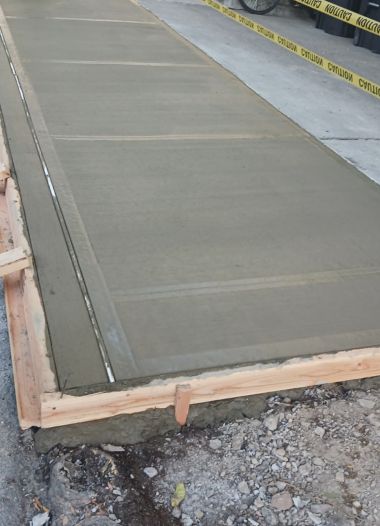How Thick Should a Concrete Sidewalk Be?

When installing or repairing a concrete sidewalk, thickness is one of the most important factors. It determines how long the sidewalk will last, how safe it will be, and whether it meets NYC regulations. A slab that’s too thin will crack and deteriorate quickly. One that’s too thick can waste money and still fail inspections if it doesn’t follow city rules.
For property owners in Brooklyn, this detail matters even more. The NYC Department of Transportation (DOT) has strict standards for sidewalk construction. Not following them can lead to violations, fines, and costly do-overs.
Standard Sidewalk Thickness
For most residential and commercial sidewalks, the recommended thickness is at least 4 inches. This is strong enough for everyday foot traffic, strollers, wheelchairs, and light loads.
Some areas need more depth:
Driveway crossings or vehicle zones: Minimum 7
inches in
NYC
ADA ramps: May need extra depth for slope stability
Busy
commercial
zones: Often built at 6–8 inches for added strength
in Brooklyn, the DOT requires 4 inches for standard sidewalks and 7 inches for sections where vehicles cross.
Why Thickness Matters
Concrete thickness directly affects:
Durability: Thicker slabs resist
cracks from freeze-thaw
cycles, soil movement, and tree roots
Safety: A stable surface reduces
trip
hazards
Compliance: Meeting DOT specs avoids violations and forced
repairs
Longevity: Proper thickness means your sidewalk can last for
decades
Thin sidewalks often suffer from early cracking, uneven settling, scaling, and faster wear.
NYC DOT Sidewalk Requirements
According to NYC DOT guidelines, standard sidewalks must be at least 4 inches thick. For driveway crossings, the required thickness increases to a minimum of 7 inches to handle the weight of vehicles. In many cases, especially for these thicker sections, reinforcement such as wire mesh or steel bars is also required to provide extra strength and durability.
Failure to meet these requirements can result in failed inspections, violations under Section 19-152 of the Administrative Code, and being forced to replace the sidewalk at your own expense.
Factors That Influence Sidewalk Thickness
Even though NYC sets minimum standards, other conditions may require more
depth:
Soil
stability: Loose or weak soil may need thicker slabs or a reinforced
base
Load
demands: Driveway aprons or loading areas need extra thickness for vehicle
weight
Weather: NYC’s freeze-thaw cycles call for durable slabs to
resist frost
heave
Accessibility standards: ADA-compliant ramps often require special
design and thickness
Best Practices for a Long-Lasting Sidewalk
Getting the thickness right is only one step toward building a durable sidewalk. To ensure long-lasting results, the base should be properly excavated and compacted before pouring the concrete. Using the correct mix is also important, and in NYC a strength of at least 3,500 psi is recommended. In areas like driveways or vehicle crossings, adding reinforcement with steel bars or wire mesh provides extra durability. Proper drainage must also be considered, since standing water can damage the concrete over time. Finally, it’s essential to hire a DOT-licensed contractor, as unpermitted DIY sidewalk work is not allowed in Brooklyn and can result in violations.
Final Takeaway
In NYC, the minimum sidewalk thickness is 4 inches, and 7 inches where vehicles cross. Anything less won’t pass inspection and will likely lead to cracks, fines, and replacement costs.
Saving money by cutting corners today can mean paying double tomorrow. By following DOT specifications and hiring a licensed contractor, you’ll get a sidewalk that is safe, compliant, and built to last.
If your sidewalk has cracks or DOT violations, contact a licensed NYC contractor to handle the repair the right way.
What NY Has to Say
Read More ReviewsOur Latest Blogs
-
Why Concrete Is the Ideal Driveway Material
Concrete is perhaps the most popular choice of materials when it comes to sidewalks in New York City and, indeed, the entire country. And why is that? We'll tell you why: Concrete boasts some truly c […]
-
How to Handle DOT Violation Repairs for Your Sidewalk
If you own property in the NYC area, chances are, you're responsible for the upkeep of the sidewalks outside your building. Not only that, but you're also liable for any personal injuries that occur […]
